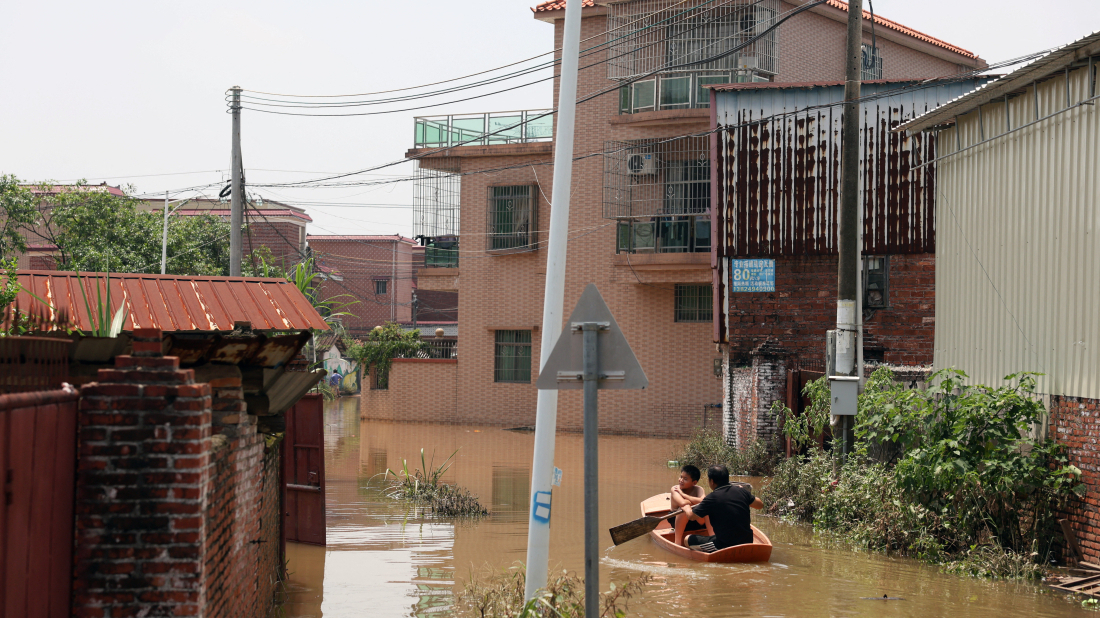On the ground in Tehran as explosions rocked the Iranian capital
As the strikes on Tehran began on Saturday (28 February), Touraj Shiralilou sent us this report from the Iranian capital....

The residents of Pingtou, a small village in China's southern Guangdong province, are grappling with the worst floods in living memory. While the region is accustomed to typhoons and seasonal downpours, this week’s flooding has shocked even the oldest villagers.
Between August 2 and 6, a record 622.6 mm (24.5 inches) of rain fell on Guangzhou, the provincial capital—nearly three times the city’s average August rainfall. According to state media, at least seven people died in Guangzhou, while no fatalities have been confirmed in Pingtou so far.
In Pingtou, the flooding has left homes submerged and streets waterlogged. Villagers waded through brown, knee-deep water on Friday, dragging damaged belongings from their homes. At least four buildings collapsed during the torrential rains.
“The older folks say that in the 100 years we've been here, they've never seen flooding like this,” said Mr. Zhong, a resident in his 50s. Water marks on nearby homes rose more than a metre high.
Lack of warning and support
Despite the scale of the flooding, residents say they received no warning or alerts. Many were caught off guard during the night.
73-year-old Zhang was woken by her daughter-in-law and took shelter in her son’s two-storey home. The next morning, she discovered her own house had collapsed.
“I’d been living in that house for over 50 years,” she said, sifting through the wreckage.
Others echoed frustration over the absence of government support. Mr. Zhong said officials told residents there was no relief aid available.
“There wasn’t even a bottle of mineral water provided,” he said.
Economic loss for farmers
Outside the village, local fish and duck farmer Hu Songlin said the floods had swept away his fish stock, causing immediate losses estimated at 120,000 yuan.
“Now we won’t be able to earn a single cent,” his wife Hua said.
Wider climate impact across China
The crisis in Pingtou is part of a larger pattern of extreme weather affecting China. The country is currently dealing with record rainfall in both its northern and southern regions, alongside extended heatwaves in its interior provinces.
On Thursday, China’s central government announced 430 million yuan ($59.9 million) in additional disaster relief funding, raising the total since April to over 5.8 billion yuan. Yet, many local communities, such as Pingtou, report not seeing this support on the ground.
Climate change a driving factor
Experts point to climate change as a key driver of the country’s increasing weather volatility.
“Global warming can lead to more intense rainfall,” said Professor Johnny Chan of the City University of Hong Kong. “But there’s only so much water—so when one region gets more, others get less. We're seeing wetter areas get wetter, and dry regions become even drier.”
Tensions between the U.S. and Iran are escalating, with Washington ordering a significant military build-up in the region and multiple countries evacuating diplomatic staff amid fears of further instability.
Israel has launched a pre-emptive missile strike against Iran, the Defence Minister said on Saturday, as the military sounded air raid sirens to prepare the public for possible retaliation.
The situation in Cuba was heating up and called for restraint following a deadly incident involving a Florida-registered speedboat off the coast of the Caribbean island, the Kremlin said on Thursday (26 February).
Russian President Vladimir Putin’s special envoy, Kirill Dmitriev, arrived in Geneva and may hold talks with U.S. officials, according to the RIA news agency.
Ankara has rejected media reports claiming it plans to deploy military forces into Iranian territory in the event of a U.S. attack on the Islamic republic.
The death toll from heavy rains and flooding in Brazil’s Minas Gerais state has risen to 46, authorities said, with 21 people still reported missing. The storms triggered landslides and widespread flooding, displacing thousands across Juiz de Fora and Uba.
The administration of U.S. President Donald Trump on Thursday (12 February) announced the repeal of a scientific finding that greenhouse gas emissions endanger human health, and eliminated federal tailpipe emissions standards for cars and trucks.
Tropical Cyclone Gezani has killed at least 31 people and left four others missing after tearing through eastern Madagascar, the government said on Wednesday, with the island nation’s second-largest city bearing the brunt of the destruction.
Rivers and reservoirs across Spain and Portugal were on the verge of overflowing on Wednesday as a new weather front pounded the Iberian peninsula, compounding damage from last week's Storm Kristin.
Morocco has evacuated more than 100,000 people from four provinces after heavy rainfall triggered flash floods across several northern regions, the Interior Ministry said on Wednesday.
You can download the AnewZ application from Play Store and the App Store.

What is your opinion on this topic?
Leave the first comment